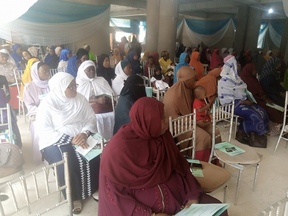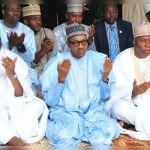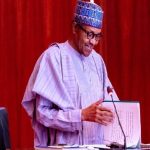Muslims have been reminded to reflect on the teachings of the Ramadan fast in their daily lives.
The Director, of the International Institute of Islamic Banking and Finance, Bayero University Kano, Professor Muhammed Shaibu, gave the reminder in an annual Ramadan Lecture titled ‘RAMADAN LESSONS: INSPIRATION FOR REFORM.’
The annual Ramadan lecture is the 20th in the series organised by Al-habibiyyah Islamic Society held in Abuja, Nigeria.
Professor Shuaibu said Fasting prepares believers for hardships and sacrifice adding that Muslims learn in Ramadan how to struggle against the forces of evil in their selves, in the society around them, and the world at large.

He explained that fasting in the month of Ramadan helps Muslims to understand the suffering and pains of the poor and needy.
Professor Shaibu further said, Muslims should have ‘Taqwa’ that is, Allah’s consciousness, and piety, which signifies submission to Allah and total commitment to all that is good and rejection of all that is evil and bad.
Another lesson of Ramadan, according to Professor Shuaibu, is the valuable practice of self-discipline, love for one another, and sustaining solidarity among people.
The Chief Imam Al-Habibiyyah Islamic Society Imam Fuad Adeyemi said the annual Ramadan lecture is significant in promoting Ramadan teachings, values and practice.
Imam Fuad noted that “the lessons of Ramadan will give us a guide on how we should reform our lives.”
He explained that Al-habibiyyah is embarking on many life-changing programmes for the good of humanity and these include the food bank and zakat programmes.
Alhaji Lawal Garba, who chaired the event, also spoke and urged Muslims to continue fasting after the month of Ramadan for spiritual rebirth.
Al-habibiyyah is an Islamic think-tank whose activities include education, Islam propagation through Da’awa, religious harmony promotion through inter-religious dialogue, counseling, and welfare assistance.
Muslims have been reminded to reflect on the teachings of the Ramadan fast in their daily lives.
The Director, of the International Institute of Islamic Banking and Finance, Bayero University Kano, Professor Muhammed Shaibu, gave the reminder in an annual Ramadan Lecture titled ‘RAMADAN LESSONS: INSPIRATION FOR REFORM.’
The annual Ramadan lecture is the 20th in the series organised by Al-habibiyyah Islamic Society held in Abuja, Nigeria.
Professor Shuaibu said Fasting prepares believers for hardships and sacrifice adding that Muslims learn in Ramadan how to struggle against the forces of evil in their selves, in the society around them, and the world at large.

He explained that fasting in the month of Ramadan helps Muslims to understand the suffering and pains of the poor and needy.
Professor Shaibu further said, Muslims should have ‘Taqwa’ that is, Allah’s consciousness, and piety, which signifies submission to Allah and total commitment to all that is good and rejection of all that is evil and bad.
Another lesson of Ramadan, according to Professor Shuaibu, is the valuable practice of self-discipline, love for one another, and sustaining solidarity among people.
The Chief Imam Al-Habibiyyah Islamic Society Imam Fuad Adeyemi said the annual Ramadan lecture is significant in promoting Ramadan teachings, values and practice.
Imam Fuad noted that “the lessons of Ramadan will give us a guide on how we should reform our lives.”
He explained that Al-habibiyyah is embarking on many life-changing programmes for the good of humanity and these include the food bank and zakat programmes.
Alhaji Lawal Garba, who chaired the event, also spoke and urged Muslims to continue fasting after the month of Ramadan for spiritual rebirth.
Al-habibiyyah is an Islamic think-tank whose activities include education, Islam propagation through Da’awa, religious harmony promotion through inter-religious dialogue, counseling, and welfare assistance.
Muslims have been reminded to reflect on the teachings of the Ramadan fast in their daily lives.
The Director, of the International Institute of Islamic Banking and Finance, Bayero University Kano, Professor Muhammed Shaibu, gave the reminder in an annual Ramadan Lecture titled ‘RAMADAN LESSONS: INSPIRATION FOR REFORM.’
The annual Ramadan lecture is the 20th in the series organised by Al-habibiyyah Islamic Society held in Abuja, Nigeria.
Professor Shuaibu said Fasting prepares believers for hardships and sacrifice adding that Muslims learn in Ramadan how to struggle against the forces of evil in their selves, in the society around them, and the world at large.

He explained that fasting in the month of Ramadan helps Muslims to understand the suffering and pains of the poor and needy.
Professor Shaibu further said, Muslims should have ‘Taqwa’ that is, Allah’s consciousness, and piety, which signifies submission to Allah and total commitment to all that is good and rejection of all that is evil and bad.
Another lesson of Ramadan, according to Professor Shuaibu, is the valuable practice of self-discipline, love for one another, and sustaining solidarity among people.
The Chief Imam Al-Habibiyyah Islamic Society Imam Fuad Adeyemi said the annual Ramadan lecture is significant in promoting Ramadan teachings, values and practice.
Imam Fuad noted that “the lessons of Ramadan will give us a guide on how we should reform our lives.”
He explained that Al-habibiyyah is embarking on many life-changing programmes for the good of humanity and these include the food bank and zakat programmes.
Alhaji Lawal Garba, who chaired the event, also spoke and urged Muslims to continue fasting after the month of Ramadan for spiritual rebirth.
Al-habibiyyah is an Islamic think-tank whose activities include education, Islam propagation through Da’awa, religious harmony promotion through inter-religious dialogue, counseling, and welfare assistance.
Muslims have been reminded to reflect on the teachings of the Ramadan fast in their daily lives.
The Director, of the International Institute of Islamic Banking and Finance, Bayero University Kano, Professor Muhammed Shaibu, gave the reminder in an annual Ramadan Lecture titled ‘RAMADAN LESSONS: INSPIRATION FOR REFORM.’
The annual Ramadan lecture is the 20th in the series organised by Al-habibiyyah Islamic Society held in Abuja, Nigeria.
Professor Shuaibu said Fasting prepares believers for hardships and sacrifice adding that Muslims learn in Ramadan how to struggle against the forces of evil in their selves, in the society around them, and the world at large.

He explained that fasting in the month of Ramadan helps Muslims to understand the suffering and pains of the poor and needy.
Professor Shaibu further said, Muslims should have ‘Taqwa’ that is, Allah’s consciousness, and piety, which signifies submission to Allah and total commitment to all that is good and rejection of all that is evil and bad.
Another lesson of Ramadan, according to Professor Shuaibu, is the valuable practice of self-discipline, love for one another, and sustaining solidarity among people.
The Chief Imam Al-Habibiyyah Islamic Society Imam Fuad Adeyemi said the annual Ramadan lecture is significant in promoting Ramadan teachings, values and practice.
Imam Fuad noted that “the lessons of Ramadan will give us a guide on how we should reform our lives.”
He explained that Al-habibiyyah is embarking on many life-changing programmes for the good of humanity and these include the food bank and zakat programmes.
Alhaji Lawal Garba, who chaired the event, also spoke and urged Muslims to continue fasting after the month of Ramadan for spiritual rebirth.
Al-habibiyyah is an Islamic think-tank whose activities include education, Islam propagation through Da’awa, religious harmony promotion through inter-religious dialogue, counseling, and welfare assistance.
Muslims have been reminded to reflect on the teachings of the Ramadan fast in their daily lives.
The Director, of the International Institute of Islamic Banking and Finance, Bayero University Kano, Professor Muhammed Shaibu, gave the reminder in an annual Ramadan Lecture titled ‘RAMADAN LESSONS: INSPIRATION FOR REFORM.’
The annual Ramadan lecture is the 20th in the series organised by Al-habibiyyah Islamic Society held in Abuja, Nigeria.
Professor Shuaibu said Fasting prepares believers for hardships and sacrifice adding that Muslims learn in Ramadan how to struggle against the forces of evil in their selves, in the society around them, and the world at large.

He explained that fasting in the month of Ramadan helps Muslims to understand the suffering and pains of the poor and needy.
Professor Shaibu further said, Muslims should have ‘Taqwa’ that is, Allah’s consciousness, and piety, which signifies submission to Allah and total commitment to all that is good and rejection of all that is evil and bad.
Another lesson of Ramadan, according to Professor Shuaibu, is the valuable practice of self-discipline, love for one another, and sustaining solidarity among people.
The Chief Imam Al-Habibiyyah Islamic Society Imam Fuad Adeyemi said the annual Ramadan lecture is significant in promoting Ramadan teachings, values and practice.
Imam Fuad noted that “the lessons of Ramadan will give us a guide on how we should reform our lives.”
He explained that Al-habibiyyah is embarking on many life-changing programmes for the good of humanity and these include the food bank and zakat programmes.
Alhaji Lawal Garba, who chaired the event, also spoke and urged Muslims to continue fasting after the month of Ramadan for spiritual rebirth.
Al-habibiyyah is an Islamic think-tank whose activities include education, Islam propagation through Da’awa, religious harmony promotion through inter-religious dialogue, counseling, and welfare assistance.
Muslims have been reminded to reflect on the teachings of the Ramadan fast in their daily lives.
The Director, of the International Institute of Islamic Banking and Finance, Bayero University Kano, Professor Muhammed Shaibu, gave the reminder in an annual Ramadan Lecture titled ‘RAMADAN LESSONS: INSPIRATION FOR REFORM.’
The annual Ramadan lecture is the 20th in the series organised by Al-habibiyyah Islamic Society held in Abuja, Nigeria.
Professor Shuaibu said Fasting prepares believers for hardships and sacrifice adding that Muslims learn in Ramadan how to struggle against the forces of evil in their selves, in the society around them, and the world at large.

He explained that fasting in the month of Ramadan helps Muslims to understand the suffering and pains of the poor and needy.
Professor Shaibu further said, Muslims should have ‘Taqwa’ that is, Allah’s consciousness, and piety, which signifies submission to Allah and total commitment to all that is good and rejection of all that is evil and bad.
Another lesson of Ramadan, according to Professor Shuaibu, is the valuable practice of self-discipline, love for one another, and sustaining solidarity among people.
The Chief Imam Al-Habibiyyah Islamic Society Imam Fuad Adeyemi said the annual Ramadan lecture is significant in promoting Ramadan teachings, values and practice.
Imam Fuad noted that “the lessons of Ramadan will give us a guide on how we should reform our lives.”
He explained that Al-habibiyyah is embarking on many life-changing programmes for the good of humanity and these include the food bank and zakat programmes.
Alhaji Lawal Garba, who chaired the event, also spoke and urged Muslims to continue fasting after the month of Ramadan for spiritual rebirth.
Al-habibiyyah is an Islamic think-tank whose activities include education, Islam propagation through Da’awa, religious harmony promotion through inter-religious dialogue, counseling, and welfare assistance.
Muslims have been reminded to reflect on the teachings of the Ramadan fast in their daily lives.
The Director, of the International Institute of Islamic Banking and Finance, Bayero University Kano, Professor Muhammed Shaibu, gave the reminder in an annual Ramadan Lecture titled ‘RAMADAN LESSONS: INSPIRATION FOR REFORM.’
The annual Ramadan lecture is the 20th in the series organised by Al-habibiyyah Islamic Society held in Abuja, Nigeria.
Professor Shuaibu said Fasting prepares believers for hardships and sacrifice adding that Muslims learn in Ramadan how to struggle against the forces of evil in their selves, in the society around them, and the world at large.

He explained that fasting in the month of Ramadan helps Muslims to understand the suffering and pains of the poor and needy.
Professor Shaibu further said, Muslims should have ‘Taqwa’ that is, Allah’s consciousness, and piety, which signifies submission to Allah and total commitment to all that is good and rejection of all that is evil and bad.
Another lesson of Ramadan, according to Professor Shuaibu, is the valuable practice of self-discipline, love for one another, and sustaining solidarity among people.
The Chief Imam Al-Habibiyyah Islamic Society Imam Fuad Adeyemi said the annual Ramadan lecture is significant in promoting Ramadan teachings, values and practice.
Imam Fuad noted that “the lessons of Ramadan will give us a guide on how we should reform our lives.”
He explained that Al-habibiyyah is embarking on many life-changing programmes for the good of humanity and these include the food bank and zakat programmes.
Alhaji Lawal Garba, who chaired the event, also spoke and urged Muslims to continue fasting after the month of Ramadan for spiritual rebirth.
Al-habibiyyah is an Islamic think-tank whose activities include education, Islam propagation through Da’awa, religious harmony promotion through inter-religious dialogue, counseling, and welfare assistance.
Muslims have been reminded to reflect on the teachings of the Ramadan fast in their daily lives.
The Director, of the International Institute of Islamic Banking and Finance, Bayero University Kano, Professor Muhammed Shaibu, gave the reminder in an annual Ramadan Lecture titled ‘RAMADAN LESSONS: INSPIRATION FOR REFORM.’
The annual Ramadan lecture is the 20th in the series organised by Al-habibiyyah Islamic Society held in Abuja, Nigeria.
Professor Shuaibu said Fasting prepares believers for hardships and sacrifice adding that Muslims learn in Ramadan how to struggle against the forces of evil in their selves, in the society around them, and the world at large.

He explained that fasting in the month of Ramadan helps Muslims to understand the suffering and pains of the poor and needy.
Professor Shaibu further said, Muslims should have ‘Taqwa’ that is, Allah’s consciousness, and piety, which signifies submission to Allah and total commitment to all that is good and rejection of all that is evil and bad.
Another lesson of Ramadan, according to Professor Shuaibu, is the valuable practice of self-discipline, love for one another, and sustaining solidarity among people.
The Chief Imam Al-Habibiyyah Islamic Society Imam Fuad Adeyemi said the annual Ramadan lecture is significant in promoting Ramadan teachings, values and practice.
Imam Fuad noted that “the lessons of Ramadan will give us a guide on how we should reform our lives.”
He explained that Al-habibiyyah is embarking on many life-changing programmes for the good of humanity and these include the food bank and zakat programmes.
Alhaji Lawal Garba, who chaired the event, also spoke and urged Muslims to continue fasting after the month of Ramadan for spiritual rebirth.
Al-habibiyyah is an Islamic think-tank whose activities include education, Islam propagation through Da’awa, religious harmony promotion through inter-religious dialogue, counseling, and welfare assistance.














